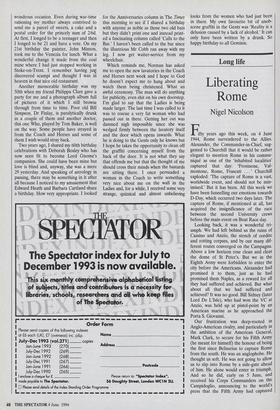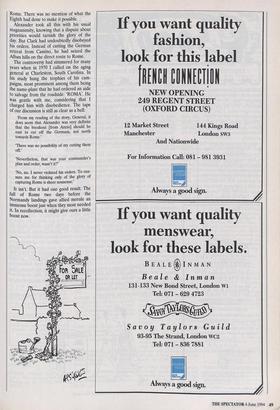Long life
Liberating Rome
Nigel Nicolson
Fifty years ago this week, on 4 June 1944, Rome surrendered to the Allies. Alexander, the Commander-in-Chief, sug- gested to Churchill that it would be rather elegant to mention Rome in his commu- niqué as one of the 'inhabited localities' captured that day: 'Frosinone, Val- montone, Rome, Frascati ' Churchill exploded: 'The capture of Rome is a vast, worldwide event, and should not be min- imised.' But it has been. All this week we have been funnelling our emotions towards D-Day, which occurred two days later. The capture of Rome, if mentioned at all, has acquired the insignificance of the race between the second University crews before the main event on Boat Race day.
Looking back, it was a wonderful tri- umph. We had left behind us the ruins of Cassino and Anzio, the stench of cordite and rotting corpses, and by our many dif- ferent routes converged on the Campagna. Above a low horizon rose clean and clear the dome of St Peter's. But we in the Eighth Army were forbidden to enter the city before the Americans. Alexander had promised it to them, just as he had promised them Naples, as a reward for all they had suffered and achieved. But what about all that we had suffered and achieved? It was no good. Bill Sidney (later Lord De L'Isle), who had won the VC at Anzio, was held up at pistol-point by an American marine as he approached the Porta S. Giovanni.
Our frustration was deep-rooted in Anglo-American rivalry, and particularly in the ambition of the American General, Mark Clark, to secure for his Fifth Army (he meant for himself) the honour of being the first since Belisarius to capture Rome from the south. He was an anglophobe. He thought us soft. He was not going to allow us to slip into Rome by a side-gate ahead of him. He alone would enter in triumph. And so he did, early on 5 June, and received his Corps Commanders on the Campidoglio, announcing to the world's press that the Fifth Army had captured
Rome. There was no mention of what the Eighth had done to make it possible.
Alexander took all this with his usual magnanimity, knowing that a dispute about priorities would tarnish the glory of the day. But Clark had undoubtedly disobeyed his orders. Instead of cutting the German retreat from Cassino, he had seized the Alban hills on the direct route to Rome.
The controversy had simmered for many years when in 1970 I called on the aging general at Charleston, South Carolina. In his study hung the trophies of his cam- paigns, most prominent among them being the name-plate that he had ordered an aide to salvage from the roadside: 'ROMA'. He was gentle with me, considering that I charged him with disobedience. The tape of our discussion is still as clear as a bell: `From my reading of the story, General, it does seem that Alexander was very definite that the breakout [from Anzio] should be east to cut off the Germans, not north towards Rome.'
`There was no possibility of my cutting them off.'
`Nevertheless, that was your commander's plan and order, wasn't it?'
`No, no. 1 never violated his orders. To cen- sure me for thinking only of the glory of capturing Rome is sheer nonsense.'
It isn't. But it had one good result. The fall of Rome two days before the Normandy landings gave allied morale an immense boost just when they most needed it. In recollection, it might give ours a little boost now.



























































 Previous page
Previous page